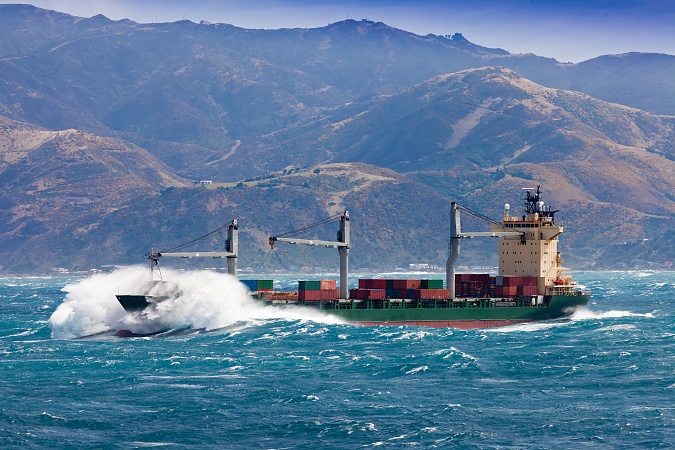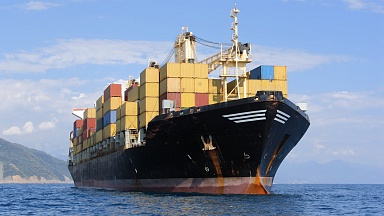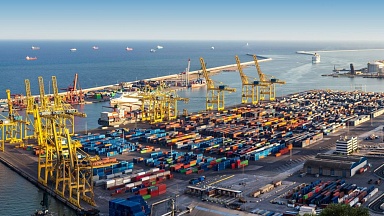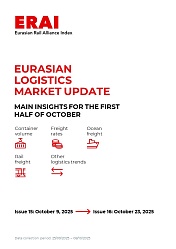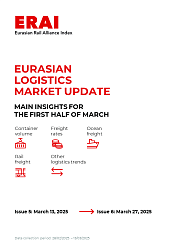Ocean freight forwarders and ports are bracing for a challenging month as the ripple effect from last month’s Suez Canal blockage reaches European and Asian ports and blank sailings affect space, equipment, and other parts of the supply chain.
But analysis by Sea-Intelligence published earlier this month indicates that the main impact of last month’s Suez blockage would subside by early June, at least in terms of liner schedules on Asia-Europe services.
Some freight sources are already reporting some European hub ports filling up as container lines that had been delayed by last month’s Suez Canal blockage discharge cargo wherever they can — in order to turn ships around as quickly as possible and return vessels to Asia — leaving imports to be fed on to their intended destinations and returns of empties to Asia in some cases prioritised over European export cargo.
In its latest Ocean Freight Market Update yesterday, freight forwarder Flexport highlighted that there had been rate increases on Asia-Europe services from most carriers in the form of GRIs from 15 April «as a result of tight space and equipment due to Suez Canal situation».
Recommending advance booking notice of at least 21 days prior to cargo ready date (CRD) for Asia-Europe services, Flexport noted that the ripple effect from the Suez Canal blockage «will become very visible in the next few weeks, with quite a number of blank sailings from Ocean Alliance and The Alliance.»
It said capacity was «severely reduced in weeks 16, 17, 19, and 21, noting that the «equipment shortage has become very serious again, especially out of Shanghai and outports. Both space and equipment will be very challenging in the coming month.»
It reported a similar picture for services from Asia to the US east coast (USEC), which was impacted by Suez Canal capacity issues and had also seen a GRI on 15 April.
Flexport added that carriers were now «starting to look ahead to the 2021 contract year in the midst of extreme challenges to the USEC and inland locations. Premium remains the entry point to the market on almost all lanes. Transloading services are becoming more essential to avoid challenges to the USEC.»
Europe-North America transatlantic westbound were also severely impacted, Flexport noted, with a GRI implemented on 15 April and another likely from 1 May. It recommended advanced booking notice «of at least 5 weeks prior to CRD», noting that this market was «expected to remain dynamic through Q2 as capacity stays heavily constrained», urging customers that «booking early is key to securing space. Use Premium products for the urgent cargo needing higher reliability.»
On the equipment side, it noted that equipment supply «is extremely tight across Europe as port congestion and lower vessel capacity hinder empty-container repositioning, particularly at inland depots», advising customers to «allow flexibility in routing and empty pick up from the port».
Looking at transatlantic capacity development, it noted that there were two upcoming blank sailings, in week 17 and week 19, warning customers to «expect more void sailings and change of port rotation or port omissions announced at short notice in the midterm as carriers try to recover weekly schedule integrity».
Port of Felixstowe operational update
In an update at the weekend from the UK’s Port of Felixstowe, the Hutchison-operated port stressed that it was currently «fully operational», adding: «This week will be very busy as vessels delayed and diverted due to the recent Suez Canal blockage arrive at the same time as scheduled vessels, although no significant delays are expected.
«To help manage the extra volume, extended Sunday opening hours for collection & delivery of containers will be available up to, and including Sunday, 9th May.»
European intermodal operators have reported increased congestion at some European container ports. Barge operator Contargo yesterday reported average waiting times for the handling of its barges in Antwerp of 41 hours and in Rotterdam of 34 hours.
Other European freight forwarders have outlined some of their preparations in anticipation of a challenging few weeks.
Forwarders make preparations
Norman Global Logistics said last week it was expecting congestion in North Europe’s major ports will reach «critical» levels over the next four weeks, as container terminals try to work through the backlog of fully laden ships delayed by the six-day Suez Canal closure, noting that «some lines have stopped new bookings again».
Among its responses it said the company was «block-booking delivery resource to try and clear containers from the port, as swiftly as possible after vessel arrival. Our ops teams are working tirelessly to keep supply chains optimised and all NGL customers can use the live tracking links on their daily nForm shipment report to see status summaries and precisely where their shipments are.»
It encouraged customers with urgent orders, in either direction, to discuss their options, highlighting the potential to use its deferred air freight service, which it said was «particularly popular for time-sensitive shipments, because it is cheaper than direct and only takes on average 3-5 days, to keep your supply chain running».
UK freight forwarder Metro Shipping last week noted that with lockdown restrictions easing in England and the opening of non-essential retail, analysts were predicting a steep rise in sales, with data confirming «that consumer confidence is at an all-time high.
«And with global supply chains likely to suffer ‘Suez-related’ disruption for several months, orders will need to be expedited and replenishment assured, using a blend of modal and transit options, if they are to maximise the revenue potential of this opportunity.»
Potentially weeks of delays
It highlighted that although lines such as Maersk has by the middle of this month reopened its online bookings for spot shipments and short-term contracts, «booking acceptances by them, or any other line, will be determined by port capacity and equipment availability».
Metro added: «The hope is that the post-Suez impact on ports in Europe and the UK will pass quickly, but shippers should expect delays and equipment shortages at Asian ports to continue, because we have already missed two weeks in terms of getting equipment back to Asia. Asian ports will feel the effects of the Suez disruption far more, with schedules affected later in the second quarter, making it even harder for carriers to get their schedules under control and empty containers positioned to regions that need them for loading — this situation is already becoming critical again and to a similar situation experienced before Chinese New Year.»
It highlighted that Mediterranean ports experienced a 60% drop in export capacity during the Suez closure, with a sharp recovery as the vessels finally arrived. «But capacity availability is fluctuating, with export cargo facing delays of a week or two, while ports at the Asia end of the trade will start to feel the impact of ship delays from mid-May.»
On the Asia-North Europe trade lane, Metro said «the volatility being experienced with capacity was more significant and longer lasting than on the Mediterranean, with the full effects expected to be felt in Asia in the week beginning 24 May — over a month away, which demonstrates the longevity of the situation and time it will take to recover anything like a normal service situation.»
It added: «Global supply chains will continue to be impacted by the fallout from the Suez Blockage for some weeks and possibly months,» highlighting that the company had launched a ‘real-time’ GPS application on its MVT supply chain visibility platform, «which is monitoring all Suez-impacted vessels, with consignment view to SKU level».
Metro added: «We are flexing, updating and adding alternative solutions and recoveries, across all modes of transport and geographies, to keep supply chains fully functioning.» It said interest in its air and sea-air products, as a recovery for ocean freight delays, had «increased massively», encouraging shippers to contact the company «without delay, if you have critical import or export Asia shipments pending».
Suez impact to clear by June
New analysis by Sea-Intelligence published this week indicated that the impact of last month’s Suez blockage would subside by early June, at least in terms of liner schedules on Asia-Europe.
Sea-Intelligence noted that the shipping lines «have had time to plan and re-organize their operational schedules after the disruption caused by the Suez incident», meaning that «the planned deployment of vessels on Asia-Europe has changed somewhat over the past two weeks». In issue 510 of Sea-Intelligence’s Sunday Spotlight, the container shipping analyst said it had «updated our analysis on the ripple effects on Asia-Europe network capacity and expanded it to see when exactly the main Suez ripples would be removed from the system. In essence, the Asia-North Europe trade is on track to have all the effects removed by early June.»
